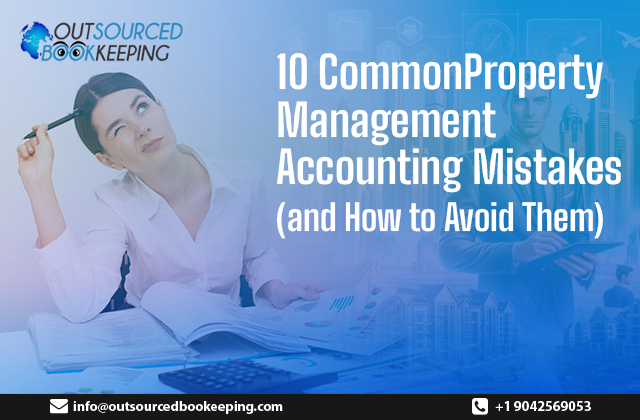Handling rental income, maintenance bills, deposits, and vendor payments is not simple. Property managers wear many hats, but none is more important than managing the money. One mistake can snowball into tax issues, lost income, or tenant disputes. Whether you manage five units or fifty, avoiding errors in property management accounting is key to long-term success.
This blog looks at ten common accounting mistakes in property management and how to avoid them using practical methods and better systems.

- Mixing Personal and Business Finances
It is the most common and the most harmful error. When personal and property transactions are made using the same bank account or credit card, confusion arises, deductions are missed, and there is a risk of audit.
How to avoid it:
Open bank accounts that are specific to each property or portfolio. Personal expenses should never be financed by the business. Connect your accounting software with only your business accounts.
- Not Recording Transactions in Real Time
Waiting until the end of the month to record income and expenses is risky. Details get forgotten, invoices get misplaced, and your cash flow reports become inaccurate.
How to avoid it:
Update your books weekly or use automation tools that sync transactions. Good property management bookkeeping means your records are never behind.
- Ignoring Security Deposits
Security deposits are not income. They are liabilities. Many property managers mistakenly log them as rent income, which causes problems during tax season or when refunds are due.
How to avoid it:
Create a separate liability account for security deposits. Track them per tenant. Do not include them in revenue calculations.
- Failing to Track Expenses by Property
You need to know how each property is performing. But if you bulk all expenses together, you will never know which unit is profitable and which one is a drain.
How to avoid it:
Use class or job tracking in your software. Each transaction should be tagged to a specific property. If you use property management in QuickBooks Online, enable class tracking and name each property as a class.
- Not Reconciling Bank Accounts Monthly
Skipping bank reconciliations is like driving without a dashboard. You may be heading for a crash and not even realise it.
How to avoid it:
Set aside one day a month to reconcile each account. Match every transaction in your books with your bank statement. This keeps errors and fraud in check.
- Using the Wrong Chart of Accounts
A generic chart of accounts does not work for property management. You need categories specific to your business, like rent income, maintenance, landscaping, property tax, and cleaning services.
How to avoid it:
Build a custom chart tailored for property income and expenses. If you use professional property management accounting, they will often do this for you.
- Poor Document Storage
Losing receipts, lease agreements, and vendor invoices is common. But during a tax audit or tenant dispute, not having proof can lead to penalties.
How to avoid it:
Go digital. Store documents in the cloud and attach them to entries in your software. This keeps everything secure and searchable.
- Forgetting to Record Partial Payments
Sometimes tenants pay part of the rent or make staggered payments. If this is not recorded properly, your books may show an incorrect balance or overstate income.
How to avoid it:
Always record the exact amount paid on the date received. Leave a balance due if it is not the full payment. Automate reminders for pending amounts.
- Not Backing Up Your Data
Accidental deletion or system failure can wipe out years of data. Without backup, recovery is difficult or impossible.
How to avoid it:
Use cloud-based tools with automatic backup. If using offline tools, back up weekly on an external drive or secure cloud storage.
- Trying to Do It All Alone
Many property managers try to handle books on their own while managing tenants, repairs, and listings. It becomes overwhelming. Mistakes multiply, and important tasks get missed.
How to avoid it:
Outsource or delegate. Use software made for property management accounting, or hire a bookkeeper who understands the real estate market. You focus on properties, they focus on the numbers.
Final Thought
Good property management is built on good accounting. If your books are clean, your business runs smoother. You can spot issues early, plan for growth, and stay compliant. Most of these mistakes happen not because of a lack of knowledge, but because of a lack of systems. With tools like property management in QuickBooks Online, class tracking, cloud storage, and digital invoicing, you can stay organised and audit-ready throughout the year.
The key is to set up strong bookkeeping habits, review your numbers often, and seek help when needed. That is how you build a profitable and professional property management business. One that runs with clarity, not chaos.



